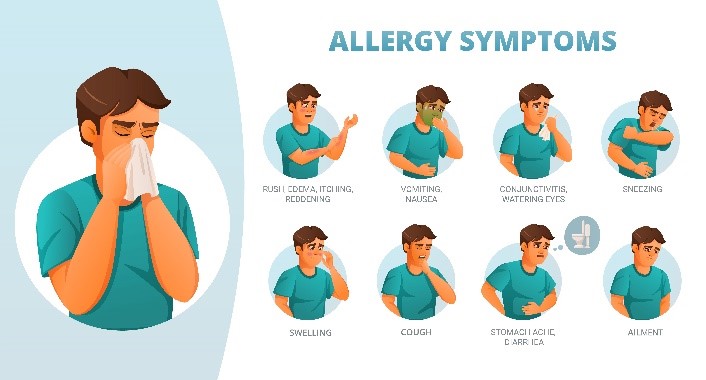Treatments Allergies Allergy

Battling Allergies: Understanding, Coping, and Living Well
When an allergic individual encounters an allergen, their immune system overreacts and produces an antibody called immunoglobulin E (IgE). IgE triggers the release of various chemicals, including histamine, which leads to the typical allergic symptoms.
Allergies, the body’s exaggerated immune response to harmless substances, affect millions of people worldwide. From seasonal allergies to food sensitivities, these conditions can cause significant discomfort and disruption in daily life. However, with the right knowledge and strategies, individuals can manage their allergies effectively, enabling them to live a fulfilling and symptom-free life. In this blog, we will explore the world of allergies, from their causes and symptoms to practical tips for coping and thriving despite their presence.
Understanding Allergies:
When an allergic individual encounters an allergen, their immune system overreacts and produces an antibody called immunoglobulin E (IgE). IgE triggers the release of various chemicals, including histamine, which leads to the typical allergic symptoms.
It is important to note that the prevalence of allergies is quite common and can vary by region, age group, and other demographic factors. There are several types of allergies, including:
The exact cause of allergies is not fully understood, but both genetic and environmental factors play a role. If a person has a family history of allergies, they are more likely to develop allergies themselves. Environmental factors, such as exposure to allergens early in life or living in a highly polluted area, may also contribute to the development of allergies.
Role of Homeopathy
As mentioned above by allopathic medications one can only suppress or desensitize the immune system as a result the immune system becomes weak and the person becomes sick more often. Homeopathy by Holistic and Individualistic approach boosts the immune system and cures the disease so that the immunity can get strong. If you or your known is facing any allergic issues feel free to Contact Dr. Singh’s Homeopathy.
Conclusion:
Living with allergies may present challenges, but armed with knowledge, strategies, and a positive attitude, it is possible to get cured. By identifying triggers, minimizing exposure, seeking medical help, and adopting healthy lifestyle habits, individuals can reduce the impact of allergies on their daily lives. Remember, you are not alone in this journey, and with Dr. Singh’s Homeopathy, you can thrive while keeping allergies at bay.

